Psoriasis
Understanding and Treating Psoriasis
What Causes Psoriasis?
Caused by an abnormality in the immune system, Psoriasis is a non-contagious skin condition that results in the increased production of new skin cells. Unable to shed the old skin cells quickly enough, the patient’s skin accumulates these dead cells on the surface, leading to characteristic symptoms.
Types of Psoriasis
Psoriasis presents itself in various types, each with unique characteristics:Plaque Psoriasis: The most common form of the disease. It appears as red and pink patches with a silvery scale. Common areas include the scalp, elbows, knees, hands, and feet but can appear anywhere on the skin and can even affect the nails.
Guttate Psoriasis: Often diagnosed in children, though it can also affect adults. Guttate psoriasis frequently follows a cold or flu-like illness, such as strep throat, and appears as small, drop-shaped lesions.
Pustular Psoriasis: Characterized by blistered, pus-filled lesions surrounded by reddened skin. While it can appear anywhere on the body, the hands and feet are commonly affected.
Inverse Psoriasis: Occurs in areas where the skin folds, such as the armpits and groin, appearing as smooth, inflamed red patches.
Psoriasis Prevalence and Impact
Psoriasis affects approximately 4.5 million Americans annually and is slightly more common in women. This chronic condition can significantly impact the quality of life, causing physical discomfort and emotional distress.
Professional Care at The Dermatology & Skin Surgery Center of Wilmington, NC
At The Dermatology & Skin Surgery Center of Wilmington, we offer a variety of treatment options to help you navigate and manage psoriasis effectively. Our team of skilled dermatologists will work with you to develop a personalized treatment plan tailored to your specific type of psoriasis and severity.
Commitment to Your Skin Health
Our comprehensive approach includes both medical and lifestyle interventions to reduce symptoms and improve your skin health. Treatments may include topical therapies, phototherapy, systemic medications, and biologics. Your healthy skin is our priority, and we are dedicated to providing you with the highest standard of care to achieve the best possible outcomes. Schedule an appointment to start your journey toward better skin health and improved quality of life.
Examples of Psoriasis
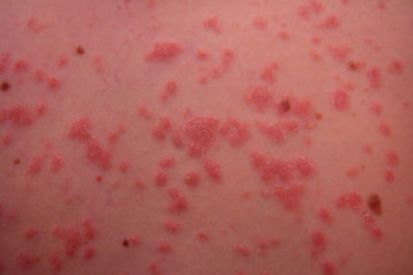
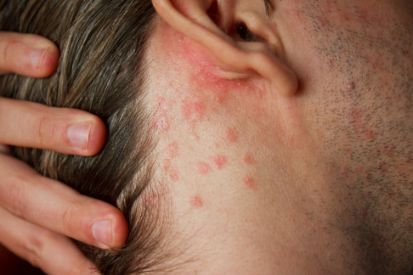
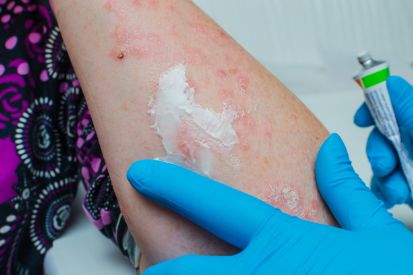
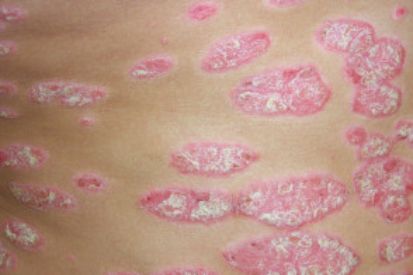
What are the Symptoms of Psoriasis?
- Red, inflamed skin.
- Silvery-white scales.
- Itching or burning sensation.
- Dry, cracked skin.
- Thickened or pitted nails.
- Joint pain and swelling in some cases.
What Causes Psoriasis?
- Genetic factors: Psoriasis often runs in families, suggesting a genetic predisposition to the condition.
- Immune system dysfunction: Abnormalities in the immune system can lead to an overactive response, triggering rapid skin cell growth.
- Other health conditions: Psoriasis is associated with an increased risk of other health issues such as cardiovascular disease, diabetes, and certain autoimmune disorders.
How to Prevent Psoriasis
Psoriasis FAQs
Psoriasis is a chronic condition, meaning it doesn't have a cure. However, it can be managed effectively with treatments and lifestyle adjustments. Many people with psoriasis lead healthy, fulfilling lives by finding the right approach to control flare-ups.
Weather can impact psoriasis, with some people experiencing flare-ups in certain conditions. Cold, dry weather can be harsh on the skin. Moisturizing regularly and adapting your skincare routine based on the weather can help minimize discomfort.
While it's generally possible, it's essential to take extra precautions. Psoriasis can affect how your skin reacts to tattoos, and flare-ups can complicate the healing process. Consulting with your dermatologist before getting a tattoo or piercing is advisable.
Stress is known to trigger or worsen psoriasis flare-ups. Finding effective stress management techniques, such as exercise, meditation, or hobbies, can be beneficial. Discussing stress management strategies with your healthcare team, including your dermatologist, can contribute to better psoriasis control.
No, psoriasis is not contagious. You can't "catch" it from someone else, and it's not something you can spread to others through contact. It's an immune system-related condition, not an infection.
From Our QualDerm Family of Brands: Learn More About Psoriasis
Psoriasis Treatments
- Oral and injectable medications that affect the immune system to control the psoriasis.
- Tight therapy treatment.
- Laser treatment and more.
Our dermatologists tailor treatment plans to individual needs, emphasizing a balance between managing symptoms and minimizing potential side effects. Regular monitoring and follow-ups with our team of skin experts are crucial for effective psoriasis management and to develop a health skin routine for years to come.
Featured Blogs
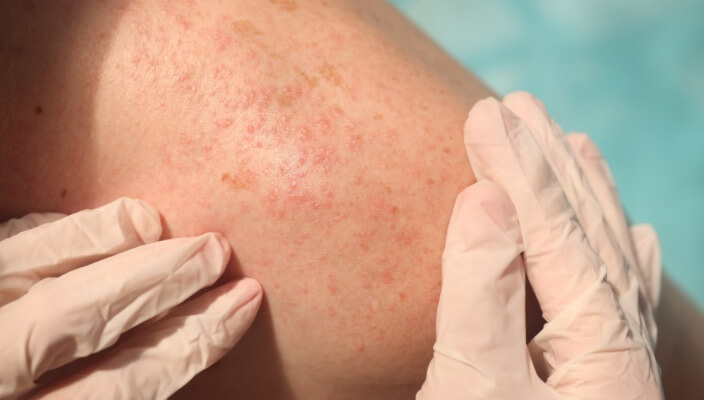
- General Dermatology
- Chronic Skin Conditions
At The Dermatology & Skin Surgery Center of Wilmington, we understand how hard it can be to distinguish eczema and psoriasis from one another.
Read More
- Skin Cancer
- General Dermatology
- Skin Exams
Have you noticed a new spot pop up on your skin or a mole that has changed a little bit over time? Though many individuals have spots, moles, and patches of skin that may look completely harmless, skin cancer can often be sneaky and show up in ways you may not expect.
Read More
- Skin Cancer
- General Dermatology
- Chronic Skin Conditions
Learn more about the most common types of skin lesions we see at Westerville Dermatology and how our dermatologists remove them.
Read MoreFeatured Products
Check your local office for current stock!
Check your local office for current stock!
